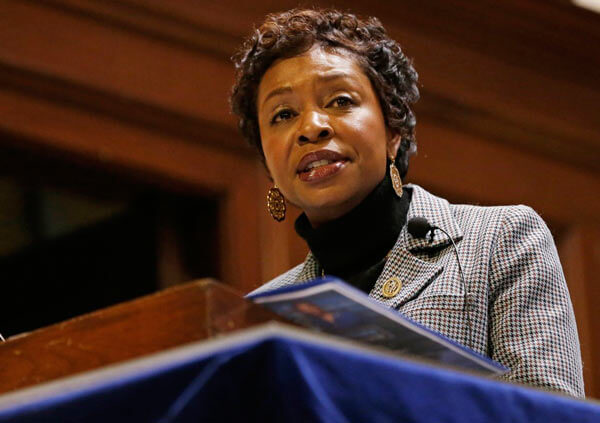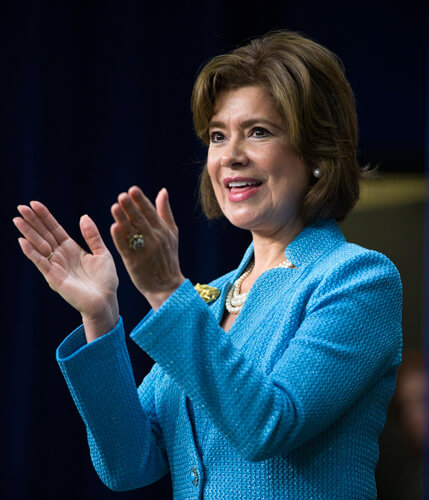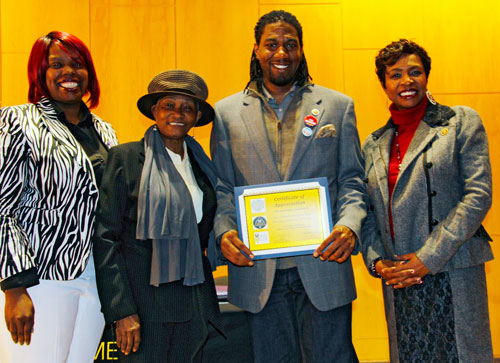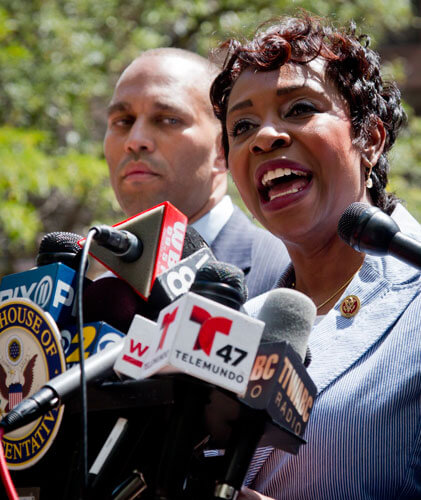Brooklyn Congresswoman Yvette D. Clarke has condemned United States President Donald Trump’s revised executive order barring entry to the US for the predominantly Muslims nationals of Iran, Libya, Somalia, Sudan, Syria and Yemen.
“The ‘revised’ Muslim ban from Donald Trump remains as unconstitutional – and unwise – as its predecessor,” said Clarke, the daughter of Jamaican immigrants, Monday night. “His basic philosophy of divide-and-conquer attempts to deny the promise of America to people across the world based on their practice on religion.
“I refuse to accept this misrepresentation of people who are my neighbors, families who have invited me into their homes, and whom I know as friends,” added the representative for the predominantly Caribbean 9th Congressional District in Brooklyn. “There are many Muslims whose contributions to our civil society are enormous, and whose rights we cannot ignore.”
Clarke noted that the judges who ruled on Trump’s initial Muslim Ban were unanimous in holding that its restrictions were likely unconstitutional, “a violation of the principle that the United States government cannot lawfully disfavor the members of any religion.
“I am confident that federal judges will find this ‘revision,’ which has the same problem, similarly flawed,” said the congresswoman, adding that she wants the families who she represents in Brooklyn to know that she stands “shoulder-to-shoulder with you in the fight against hate.
“We will never surrender our values,” Clarke declared. “We will never abandon our neighbors.”
By signing the revised executive order on Monday, aimed at stalling legal and political challenges, Trump has imposed the most significant hardening of US immigration policy in generations, immigration advocates and political observers say.
The order was revised to avoid the tumult and protests that engulfed America’s airports after the president signed his first immigration directive on Jan. 27, according to the New York Times. That order was ultimately blocked by a US federal appeals court.
The new order continued to impose a 90-day ban on travelers, but it removed Iraq, a redaction requested by Defense Secretary Jim Mattis, who feared it would hamper coordination to defeat the Islamic State, according to the Times.
It said the new order also exempts permanent residents and current visa holders, and drops language offering preferential status to persecuted religious minorities, a provision widely interpreted as favoring other religious groups over Muslims.
In addition, the new order reversed an indefinite ban on refugees from Syria, replacing it with a 120-day freeze that requires review and renewal.
The new order retains key elements of the old one, cutting the number of refugees admitted to the United States each year to 50,000 from about 110,000.
Trump is also leaving open the possibility of expanding the ban to other countries, or even putting Iraq back on the banned list if the country’s leaders fail to comply with a requirement that they increase intelligence sharing, the Times said.
“Unregulated, unvetted travel is not a universal privilege, especially when national security is at stake,” said John F. Kelly, the homeland security secretary, appearing alongside Secretary of State Rex W. Tillerson and Attorney General Jeff Sessions at the Ronald Reagan Federal Building in Washington on Monday.
Kelly said the order was now “prospective,” adding that it applied “only to foreign nationals outside of the United States” who do not have a valid visa.
The Trump administration quickly tried to break the legal logjam, filing papers in United States District Court in Washington late on Monday seeking to lift an order blocking the fulfillment of the initial ban, according to the Times.
But Trump’s revised order has done little to assuage Democratic lawmakers, and immigration and human rights advocates.
The US Senate Democratic leader, Chuck Schumer of New York, described the new order as a “watered-down ban” that was still “mean-spirited and un-American.”
Salil Shetty, Secretary General of the London-based human rights group, Amnesty International, described the revised ban as “unconstitutional, inhumane and illogical.”
“The revised travel ban shows a xenophobic policy towards Muslims, which is mutating, virus-like, into an ever more resilient strain,” he said in a statement. “By narrowing slightly the scope of the new executive order the Trump administration may have remedied some of its predecessor’s constitutional flaws but it remains blatantly discriminatory.
“Thinly disguised as a national security measure, the ban reinstates many of the most repellent elements of the original,” Shetty added. “By dimming that beacon, this executive order plays directly into the hands of those who portray the US government as being at war with Islam.”
“It is up to us all to challenge everything that this travel ban represents,” he continued.



























